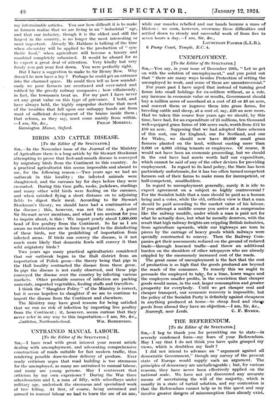UNEMPLOYMENT.
[To the Editor of the SPECTATOR.] SIR,—You say, in your issue of December 29th, "Let us get on with the solution of unemployment," and you point out that "there are many ways besides Protection of setting the unemployed to work, and some of them are uncontroversial."
For years past I have urged that instead of turning good farms into small holdings for ex-soldiers without, as a rule, any increase in economic value or results, Government should buy a million acres of moorland at a cost of 15 or 16 an acre, and convert them or improve them into grass farms, for breeding cattle and sheep, at a cost of, say, 120 an acre more. Had we taken this course four years ago we should, by this time, have bad, for an expenditure of 25 millions, ten thousand well-equipped grass farms of 100 acres each, worth from 112 to £10 an acre. Supposing that we had adopted three schemes of this sort, one for England, one for Scotland, and one for Wales, we should now have 80,000 small grass farmers planted on the land, without ousting more than 8,000 or 4,000 sitting tenants or employees. Of course, it would not have been an economic proceeding, but we should in the end have had assets worth half our expenditure, which cannot be said of any of the other devices for providing employment. In regard to its land policy, the State has been particularly unfortunate, for it has too often turned competent farmers out of their farms to make room for incompetent, or half-competent, smallholders.
In regard to unemployment generally, surely it is idle to expect agreement on a subject so highly controversial ? For the Socialist holds that a man should be paid as a human being and a voter, while the old, orthodox view is that a man should be paid according to the market value of his labour. If you attempt a middle course you arrive at a compromise like the railway muddle, under which a man is paid not for what he actually does, but what he morally deserves, with the result that high railway freights are crippling British industries, from agriculture upwards, while our highways are torn to pieces by the carriage of heavy goods which railways were specially constructed to convey. Then the Railway Com- panies get their assessments reduced on the ground of reduced trade—through lessened traffic—and throw an additional burden on the shoulders of other ratepayers who are already crippled by the enormously increased cost of the roads.
The great cause of unemployment is the fact that the cost of production is so high that the goods produced are beyond the reach of the consumer. To remedy this we ought to persuade the employed to take, for a time, lower wages and the employers smaller profits, m the conviction that cheaper goods would mean, in the end, larger consumption and greater prosperity for everybody. Until we get cheaper coal and cheaper transport, our economic recovery is impossible, but the policy of the Socialist Party is definitely against cheapness in anything produced at home—to cheap food and chew goods from abroad they have no objection.—! am, Sir, &c.,






































 Previous page
Previous page